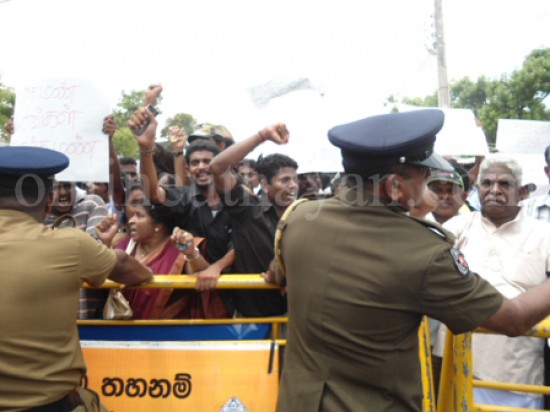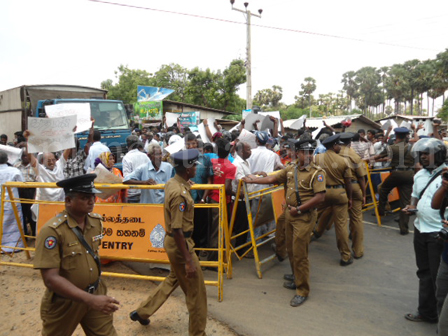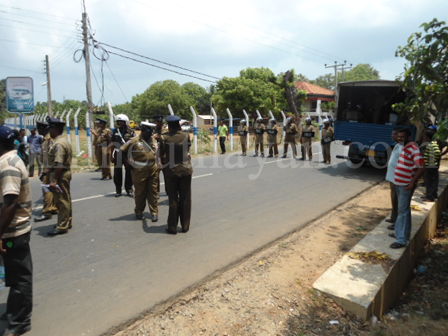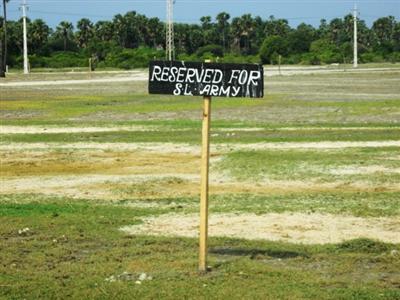Massive land grab of private land by Sri Lanka’s military deals death blow to reconciliation hopes
The acquisition of about 7000 acres of land in the Jaffna peninsula has become a major issue that impacts upon the post-war reconciliation

Hundreds of Tamil protesters were met with riot police and Sri Lankan security forces, at a demonstration on April 29, 2013 in Tellipalai against the Sri Lankan Army’s seizing of private land in Valikaamam North in Jaffna
process. The Lessons Learnt and Reconciliation Commission recommended the release back to their owners of private lands taken over for military purposes during the war. This was also the position taken by President Mahinda Rajapaksa when he made promises to the international community that the displaced people would be returned to their homes. But as recent events have shown, the acquisition of privately owned lands by the military had continued dealing another blow to the possibility of national reconciliation.
Despite protests by the affected people in the North it appears that the government is determined to go ahead with its plan to take over large extents of the land in the North for use by the security forces. Those who have been able to get inside some of these areas report that not even the foundations of the buildings remain on the land which is being prepared for new constructions. It is believed that at least some of this land will be utilized for military-run tourist hotels and economic enterprises. It may have been this reason that prompted the government to prevent the Leader of the Opposition from entering one such acquired area when he visited the North recently.
What is worthy of note is that the acquisition of land by the military that is taking place is not limited to the North and to land inhabited by Tamils. It is also taking place in other parts of the country. Recently there have been media reports about the acquisition of over 1000 acres of

Demonstrators stage a sit down protest in front of Tellipalai Divisional Secretariat, on April 29, 2013, but tensions rise as protesters breach police barricades and begin to march towards the entrance of the High Security Zone in an attempt to enter the Divisional Secretariat building in order to make their pleas for the military to leave their land. They are met with stiff police resistance.
land in the East in the traditional Sinhalese area of Panama which was a lush, serene and peaceful village on the sea coast when I last visited it during the time of the war, although vulnerable to LTTE attack. This area was the sanctuary of Sinhalese people who were forced out of their villages in the interior parts of the country during the Great Rebellion of 1818 due to the scorched earth policy of the British colonial rulers.
The Buddhist monk in the area was quoted in the media as saying that about three years ago, the people were chased away by armed men, and the following day the area was cordoned off by military personnel. But it is believed that the land has been taken over to construct a hotel complex although the military says it is for a military camp. Media reports claim that the permits from the departments of coast conservation, archaeology and forestry that are usually required prior to the construction of any building have not been obtained. In one media report a military spokesperson is quoted as saying “This is a Defence Ministry land and there is no necessity to obtain approval from any department to carry out any of our development work.”
Unexpected increase
One of the unexpected post-war developments has been the increasing role of the military in the life of the country. There has been continued recruitment by the military, increase of the military budget and the entry of the military into commercial life. The explanation given by the government for increasing the size of the military machine rather than downsizing it has been that it is to preserve national security. This has made government actions in terms of increasing the role of the military in national life difficult to criticize. After a three decade long war, there is public deference to the imperatives of national security, or what is claimed to be national security.
However, there is another explanation for the increase in the numbers of the military, and its enhanced role, after the war. This has to do with the ideology of the government. It appears that the government is modeling the Sri Lankan state on the lines of states such as Pakistan, Myanmar and Indonesia, where the military has become embedded with the civilian authorities in governing the country. In these countries the military has become a part and parcel of civilian life, and not kept strictly separate from it, as in conventional democracies. In these countries the military runs big economic enterprises such as hotels, banks and travel companies.
Where the military gets involved in business, they can often outdo the private sector in providing goods and services to the people at a cheaper price. This was seen in Sri Lanka too during the time when vegetable prices soared. The military started to sell vegetables at cheaper prices.
Likewise the military run hotels, restaurants and travel services are competitively priced and seem to be efficiently run. But they contain a huge hidden subsidy. This is on account of the salaries and logistical costs that are paid separately to the military personnel from the military budget. These costs are not included in the cost of goods and services provided by the military. Therefore they can be provided at cheaper rates to the consumers.
There is a further hidden cost of military involvement in civilian affairs which is why democratically governed countries keep the military strictly separate from civilian affairs. The military are disciplined to take orders from the top. They are not expected to question their superiors. But in democratic life, it is exactly the opposite that is expected to take place. It is the people who should be able to decide what they want. The democratically elected leaders are expected to listen to the people and implement their wishes, so long as they conform to principles of human rights and respect for democratic values.
DEMOCRATIC COST
The reported statement of the military spokesperson who said that lands taken over by the Defense Ministry do not require going through the approval process of other government departments shows the limited and sometimes one-track focus of military thinking. They tend to see security issues in primarily physical and military terms. But security has also got other dimensions, such as human security, food security, environmental security and also the need to preserve historical and archaeological sites. Good governance requires the ability to see the larger picture in a holistic manner and how the different aspects of life interact with one another.
It is significant that the government’s decision to suddenly acquire large extents of land in the North has been taken prior to the establishment of a legitimate and popularly elected civilian administration for the formerly war-stricken Northern Province. Those decisions that severely affect the lives of large numbers of people would more appropriately be taken in consultation with the elected Provincial Council after it is
constituted. The general practice in the country has been that when the government wishes to take over large tracts of land for a public purpose it discusses this matter with the affected population and with their political representatives, and gives the necessary time for legal objections to be made through the judiciary.
In Jaffna in the North more than 2000 persons who owned land are ready to file petitions in the courts of law. There is a possibility that 5000 petitions may end up being filed in the courts. It is to be hoped that, as advocated by the Lessons Learnt and Reconciliation Commission, government policy will not substitute for recourse to courts of law where the affected people have proof of title, and even where they do not have this, the civilian arm of government has the duty to carefully check and reissue them with the rights to which they are entitled. This is a matter of national interest, as what happens in one part of the country will have its consequences on the other parts as well.
The military’s takeover of land is an expansion of the role of the military in the life of the Sri Lankan nation which will affect every one of its citizens, and not merely those who belong to the ethnic minorities. Especially in a country that is recovering from three decades of warfare and violence there can be no equality between those who have guns in their hands, and those who are unarmed. This is why the military – civilian relationship in governance is problematic and why the established democracies in the world keep them separate. This democratic process now appears to be overpowered, as in Panama in the East, where the local authorities are trying to accommodate the military’s take-over of the people’s lands.


